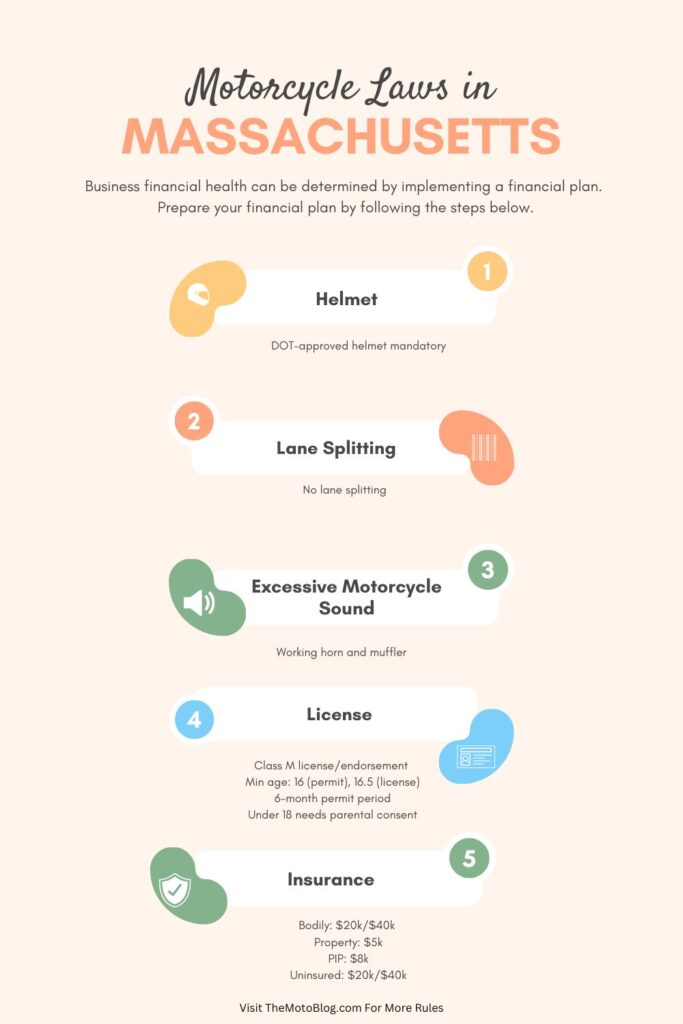Motorcycle Laws in Massachusetts: A Thorough Guide for Riders
Massachusetts stands as a gateway to New England’s most scenic motorcycle routes, offering riders access to diverse landscapes and historic byways. Bordered by New Hampshire‘s majestic mountains to the north, Connecticut‘s scenic valleys to the south, Rhode Island‘s coastal beauty to the southeast, and New York‘s expansive roadways to the west, Massachusetts maintains comprehensive motorcycle regulations designed to ensure rider safety while preserving the freedom of the open road. Whether you’re a resident or visitor, understanding these laws is crucial for a safe and compliant riding experience.

| Rule Category | Requirements |
|---|---|
| License | • Class M license/endorsement • Min age: 16 (permit), 16.5 (license) • 6-month permit period • Under 18 needs parental consent |
| Helmet & Safety | • DOT-approved helmet mandatory • Eye protection required • Face shield/goggles without windshield • Fines: $35 (1st), $75-$100 (2nd) |
| Basic Equipment | • Working signals, brakes, lights • Mirrors required • Footrests for rider/passenger • Working horn and muffler |
| Insurance | • Bodily: $20k/$40k • Property: $5k • PIP: $8k • Uninsured: $20k/$40k |
| Operation | • No lane splitting • Handlebars below shoulders • Right lane except passing • No aggressive driving |
| Sound Limits | • ≤45 mph: 82 dB • >45 mph: 86 dB |
| Passengers | • Dedicated seat required • Must have footrests • No passengers with permit |
| Registration | • Annual inspection ($15) • 7-day new bike inspection • Proof of insurance required |
| OUI Penalties | • $500-$5000 fine • Up to 30 months prison • 1-year license suspension |
| Special Rules | • Parade helmet exemption (18+) • Two bikes can share lane • Under 18 must complete education |
Licensing Requirements
Obtaining a motorcycle license in Massachusetts involves a structured process. The state requires a Class M motorcycle license or endorsement, with a minimum age requirement of 16 years for a permit and 16.5 years for a full license. Young riders under 18 must secure parental consent. A mandatory 6-month permit period precedes the full license, during which riders must pass both written and road skills tests.
Helmet and Safety Equipment Laws
Massachusetts enforces strict helmet laws for all riders and passengers. DOT-approved helmets are mandatory, with no exceptions during regular riding. Eye protection is required when riding motorcycles without windshields, which can include face shields, goggles, or protective eyeglasses. Violations incur fines starting at $35 for first offenses and increasing to $75-$100 for subsequent infractions.
Operating Rules and Regulations
The state prohibits lane splitting and maintains specific equipment requirements. Handlebars must not exceed shoulder height, and motorcycles must be equipped with functioning turn signals, rearview mirrors, footrests for both rider and passenger, horn, and muffler.
Insurance Requirements
Massachusetts mandates comprehensive insurance coverage including:
- Bodily injury coverage: $20,000 per person, $40,000 per accident
- Property damage coverage: $5,000 per accident
- Personal Injury Protection: $8,000 per person
- Uninsured motorist coverage: $20,000 per person, $40,000 per accident
Vehicle Specifications
Sound restrictions limit motorcycle noise to 82 decibels at speeds under 45 mph and 86 decibels above 45 mph. All motorcycles must have working brakes, headlights, taillights, license plate illumination, and secure seating.
Passenger Laws
Passenger safety regulations require dedicated seats and footrests. All passengers must wear DOT-approved helmets, and permit holders cannot carry passengers.
Registration and Documentation
Annual inspections are mandatory, with new motorcycles requiring inspection within seven days of registration. The inspection fee is $15, and riders must maintain proof of insurance. Registration isn’t required to obtain a motorcycle license.
Traffic Laws and Road Rules
Standard traffic regulations apply, including yielding to pedestrians, obeying speed limits, using turn signals, and maintaining proper lane position on highways.
Penalties and Enforcement
Operating Under the Influence (OUI) carries severe penalties:
- First offense: $500-$5000 fine and up to 30 months imprisonment
- License suspension: One year for first offense
- Three-year statute of limitations for accident claims
- Insurance surcharges for helmet violations persist for 6-7 years
Special Circumstances
The state allows helmet exemptions during properly permitted public parades for riders 18 and older. Two motorcycles may share a lane side-by-side, and riders under 18 must complete the Massachusetts Rider Education Program.
Whether heading to Rhode Island for coastal rides or exploring the mountains of New Hampshire, understanding Massachusetts motorcycle laws ensures safe and legal travel throughout New England.
Mastering Massachusetts motorcycle laws is just the beginning of your New England riding adventure. As you explore the region’s diverse landscapes, from coastal routes to mountain passes, remember that regulations can vary significantly across state lines. Whether you’re heading to Rhode Island‘s scenic coastline or ascending into New Hampshire‘s White Mountains, staying informed about local regulations ensures a safe and enjoyable journey. These laws, while comprehensive, are designed to protect both riders and the cherished freedom of motorcycle travel across the Bay State and beyond. By following these guidelines, you’re not just complying with the law – you’re contributing to a safer, more enjoyable riding experience for everyone on New England’s legendary roads.
Motorcycle Laws in the US By States
If you liked this article, then please subscribe to our YouTube Channel for more Bike Videos. You can also find us on Instagram, Twitter and Facebook.
Disclosure: As an Amazon Associate, I earn from qualifying purchases. Read more about Amazon Affiliate Disclaimer.

Vishwanath Mathpati
I am Vishwanath Mathpati, a full-time Blogger and Motorcyclist from Bidar, Karnataka. I love writing about my Motorcycles Stories and Riding Gears on this blog.
Know More About Me.







